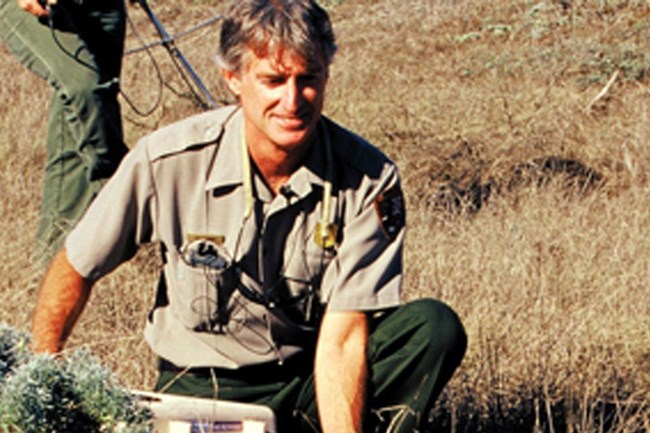
Chapter 11
Tim Coonan, Channel Islands National Park biologist (retired), discusses what is special and unique about fox subspecies on the Channel Islands, and he explains how the animals were brought back from near extinction with a project that began in 1999.
Island foxes are a unique species of fox whose ancestors are the mainland gray foxes. They have lived on the six largest Channel Islands for at least 6,000 years. Each of the six populations of island foxes is genetically different from the others. Island foxes weigh only about four to five pounds, less than most house cats. They eat a variety of foods (everything they can get their paws and teeth on!) including mice, birds, lizards, beetles, crickets, fruits, and berries.
Island foxes lived on the islands with no predators for thousands of years. As a result, they were very vulnerable when golden eagles first began showing up and breeding on the islands in the 1990s. Native bald eagles, which eat mainly fish and seabirds, had been missing since the 1950s. The bald eagles had been harmed by the release of the pesticide DDT into the ocean off the coast of southern California, which they consumed by eating fish. If the bald eagles had been around when the golden eagles arrived, the bald eagles may have kept golden eagles from finding a home on the islands.
Golden eagles began preying on the island foxes. Quickly the numbers of foxes began to decline. By 1999 there were only a handful of foxes left on the northern islands of San Miguel, Santa Rosa, and Santa Cruz. Biologists became alarmed at the declining number of island foxes and began a program to protect them.
Some of the remaining island foxes were brought into captive breeding programs established on each island. At the same time raptor biologists began trapping golden eagles and releasing them in northeastern California. Bald eagles were later reintroduced to the Channel Islands. The program has been a success, and a large number of island foxes once again live on the islands.
-
Listen to chapter 11 entry
Learn about island foxes.
Last updated: June 15, 2017
